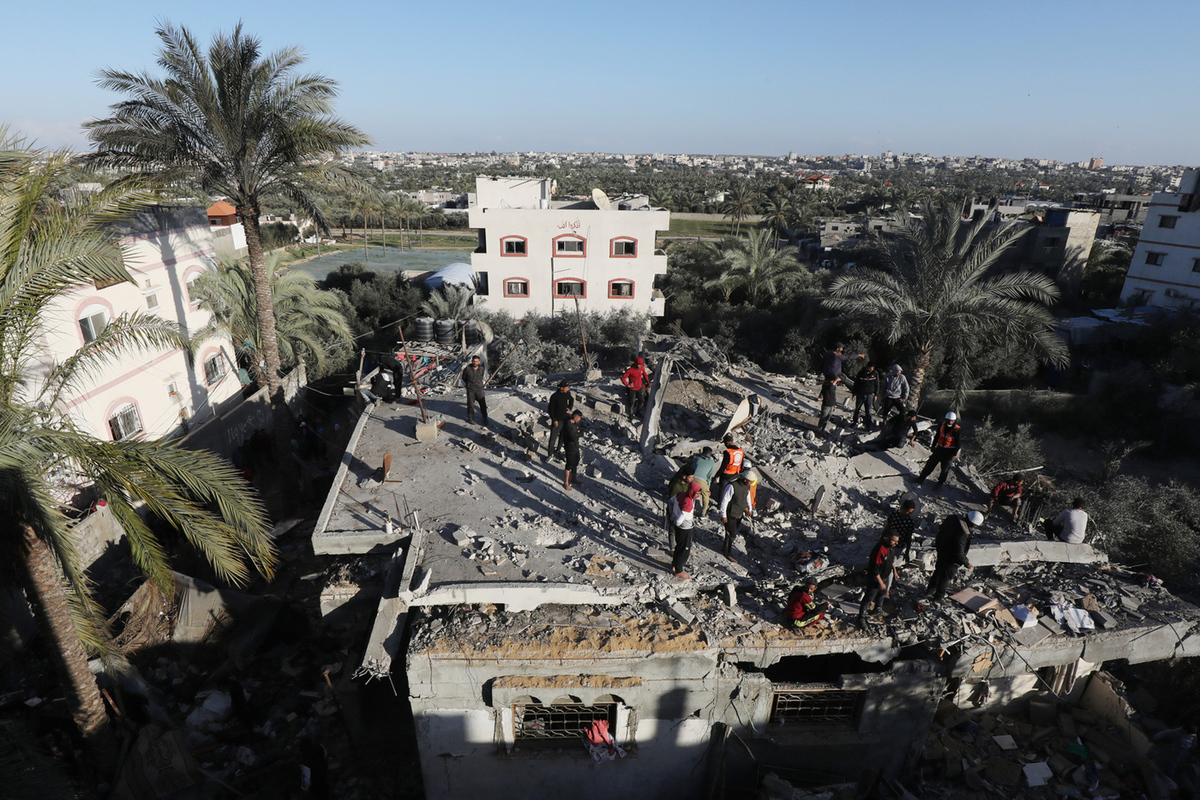With the start of Ramadan, Israelis and Palestinians froze “in anticipation of the storm”
[ad_1]

Earlier this month, a cessation of fighting ahead of the Muslim holy month seemed possible, but hopes faded after indirect talks in Cairo ended without progress last week, The Observer said.
On Friday, President Joe Biden said the deal between Hamas and Israel now “looks tough,” and when asked if he was concerned about violence in Jerusalem, he said, “I’m sure of it.”
Every year, the Observer recalls, Ramadan draws attention to Israel’s control of the towering complex in Jerusalem’s Old City, known to Muslims as al-Haram al-Sharif and to Jews as the Temple Mount, as hundreds of thousands of Muslim worshipers attempt to enter the Al-Aqsa Mosque for special prayers performed only during Ramadan. This mosque is the third most important site in Islam after Mecca and Medina. Almost next to the Al-Aqsa Mosque is the Western Wall, the holiest place for Jewish prayer.
Police raids on the mosque in 2022 and 2023 were cited by Hamas as the reason for the Oct. 7 attack, dubbed “Operation Al-Aqsa Flood.” The militant Islamist organization is seeking to mobilize Palestinians and Muslims around the world over access during Ramadan, The Observer noted.
In a video message posted Friday on a Telegram channel, Abu Obeida, a spokesman for Hamas’s military wing, called Ramadan “the month of victory, the month of jihad” and said the group was defending the honor of Muslims around the world in Gaza: “We call on our people to march on Jerusalem …pray in the mosque… and stop the occupation from achieving its goals of control and division. Al-Aqsa Mosque belongs to us.”
Earlier this month, Ismail Haniyeh, the exiled political leader of Hamas in Qatar, called on Islamist groups in the Middle East, many of them backed by Iran, to intensify attacks on Israel during Ramadan, calling for “a broad and international movement to lift the Israeli siege of Mosque al -Aksa.”
The Gaza war was sparked by a brutal Hamas attack on southern Israel in October that killed about 1,200 people, mostly civilians, The Observer recalls. Hamas militants also took 250 hostages, about half of whom were released during the November truce.
Israel then launched an offensive on Gaza that the Health Ministry said killed at least 30,878 people, mostly women and children, in Hamas-controlled territory and reduced much of the Palestinian Strip to rubble.
Last week, Israeli Prime Minister Benjamin Netanyahu told military cadets that Israel would continue a threatened ground offensive on Rafah, the last place of relative safety in Gaza, possibly during Ramadan. Even Israel’s staunch allies have warned that such an attack would lead to a humanitarian disaster in Gaza and could trigger an escalation of violence.
Rafah is the southernmost city in Gaza and is home to about a million displaced people. It is also a point of entry for desperately needed aid and a logistics center for aid agencies. Israel claims that most of Hamas’s leaders and remaining military forces are there, so their offensive cannot end until both are dealt with.
On Saturday, Biden said the potential invasion of Rafah was a “red line” for him, but added that the US would never “abandon Israel”: “Israel’s defense is still critical, so there is no red line.”
In a sign of growing tensions between the US president and his Israeli counterpart, Biden said in an MSNBC interview that he believes Netanyahu is “hurting Israel more than helping Israel” in his approach to the war, adding: “He needs to pay more attention to the innocent lives that are lost as a result of the actions taken.”
Hugh Lovatt of the European Council on Foreign Relations said the Ramadan offensive has implications for the entire region: “Hamas has the opportunity to mobilize Palestinians in Israel and the West Bank around the perception that al-Haram al-Sharif is under threat… Violence could it is easy to provoke violence elsewhere, in the West Bank or even beyond Israel’s borders, such as in Lebanon.”
Observers say the most likely immediate cause of protests and possibly violence would be the imposition of severe restrictions on prayers at the al-Haram al-Sharif mosque. But equally, the sight of crowds of Muslims praying unhindered would help ease tensions after months of conflict.
“If everything goes smoothly and people see half a million worshipers in the mosque, it will calm the situation, but if people see blocks, checkpoints and Muslims forced to pray on the road, it will be alarming,” said Samer Sinijlawi, chairman of the NGO Foundation development of Jerusalem.”
Israel’s far-right National Security Minister Itamar Ben-Gvir caused a stir last month when he recommended Netanyahu ban even Israel’s Muslim minority, about 18% of the population, from the holy site this Ramadan. His decision was rejected and Israeli police were ordered to limit the number of participants according to immediate security and crowd control criteria, with a review after a week.
Palestinians in the West Bank have been informally told that men over 60, women and children will be allowed to pass through checkpoints to access holy sites during Ramadan. Since October 7, few of the 3 million Palestinians living in the West Bank have been allowed into Israel.
Israeli officials said no restrictions would be imposed on Israeli Arabs and East Jerusalem residents.
Sinijlawi, an East Jerusalem resident, said: “Muslims will meet each other every day to pray and sit around tables, imagining pictures of what is happening in Gaza. In Ramadan, these things have 10 times the impact,” he told The Observer. – The weather is in place. We’re just waiting for the storm.”
[ad_2]
Source link








